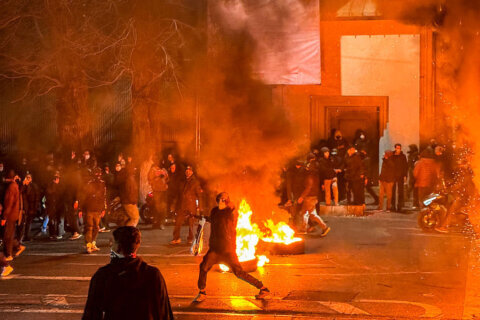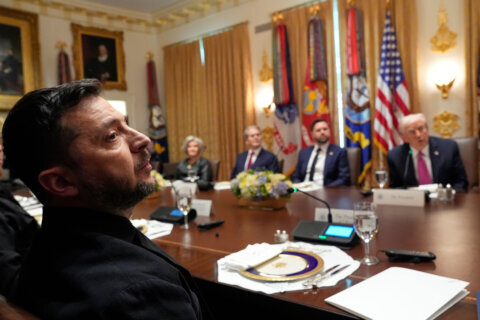WASHINGTON — Al-Qaida’s heir apparent is dead. Al-Qaida in the Arabian Peninsula (AQAP) announced Monday its co-founder and leader was killed in a U.S. missile strike.
U.S. officials, without detailing how it happened, confirmed it.
“The Intelligence Community has concluded that Nasir al-Wahishi, the leader of al-Qaida in the Arabian Peninsula (AQAP) and deputy to al-Qaida leader Ayman al-Zawahiri, has been killed in Yemen,” National Security Council (NSC) spokesman Ned Price said in a statement.
It is not clear who is responsible for his killing, but sources suggest it was conducted by the Central Intelligence Agency. The agency routinely avoids commenting on drone strikes.
A personal adviser to Osama bin Laden and one of four founders of AQAP, Wahishi was a top-tier target for the U.S. “Wahishi had led AQAP since its founding in 2009 and oversaw the group’s plotting against the United States, U.S. interests in the Arabian Peninsula, and those of our allies in the region,” Price said.
His killing comes two months after the death of Ibrahim al-Rubaish, AQAP’s spiritual leader, in another U.S. strike.
“This is a significant incident,” Alexander Evans, coordinator of the United Nations Expert Group on Al Qaida and the Taliban, told WTOP, “because Wahishi was the leader of a technologically innovative group that has had both the resources and the strategy to try and strike at international targets well beyond Yemen, where it’s based.”
AQAP, essentially al-Qaida central’s research and development division, used the support and resources to build exotic explosive devices that were hidden in unusual places while attempting to attack U.S. targets.
On Christmas Day 2009, Umar Farouk Abdulmutallab tried to bring down a Northwest Airlines jetliner over Detroit by detonating a bomb hidden in his underwear. Passengers prevented him from doing it.
The following year, two packages, each containing 11-ounce bombs, and a detonator were found on separate cargo planes. One bomb was uncovered during a stopover at East Midlands Airport in the U.K.; the other, in Dubai. Saudi Arabian intelligence authorities provided key information that helped to foiled the plot to explode the devices over Chicago and a second American city.
AQAP has already announced Wahishi’s replacement. Qasim al-Raymi, 36, the last remaining of AQAP’s four founders, assumes the leadership of an organization that is under assault not just from external forces but at home in war ravaged Yemen.
AQAP has been at war with the Houthi rebels as well as the exiled government of President Abd Rabbah Mansour Hadi. Al-Raymi and Wahishi escaped from a maximum-security prison in Sana’a in 2006, along with two dozen other men. The two of them and two other jihadists started the organization. It is al-Raymi whom many credit with planning the logistics of the Underwear Bomb plot and most of AQAP’s operations. He’s also believed to the glue of the organization, persuading the other leaders not to pledge allegiance to the Islamic State.
The fact that the U.S. has been able to locate and attack AQAP’s leaders after the last military forces were withdrawn in March 2015 is impressive to Evans.
“What we’re seeing is a momentum in terms of senior al-Qaida affiliate commanders being killed, showing that they are vulnerable to intelligence collection and disruption by international actors like the United States,” said Evans.
Another key al-Qaida figure, Mohktar Belmohktar, 43, was targeted and believed to have been killed in a U.S. military strike on Sunday in Libya.
A very active, experienced and savvy terrorist, Belmohktar became one of the organization’s grittiest operatives, having lost an eye in an explosives accident but continuing to successfully carry out high-profile attacks.
The U.S. military is dialed in to certain specific threats, but Air Force Col. Edward Thomas Jr., special assistant for public affairs to the chairman of the Joint Chiefs, says, “We continue extremely comprehensive counterterrorism operations overseas as we protect U.S. interests. While we continue work to bolster the Iraqi forces and support the moderate opposition in Syria and engage partners in other parts of the region, we will not lose our acute focus on eliminating direct threats to U.S. interests.”
NSC spokesman Price said, “The President has been clear that terrorists who threaten the United States will not find safe haven in any corner of the globe. While AQAP, al-Qa’ida and their affiliates will remain persistent in their efforts to threaten the United States, our partners and our interests, Wahishi’s death removes from the battlefield an experienced terrorist leader and brings us closer to degrading and ultimately defeating these groups.”
Thomas said, “It’s what the American people deserve and expect from us.”
The road ahead for al-Qaida is uncertain, because U.S. intelligence seems to have found the information sources that can lead them to the leaders of top terror organizations. Several of the Islamic State’s leaders have been killed in strikes this year.
Evans says there is a downside to the success of airstrikes — a new generation of more-savvy terrorists is coming along: “Many of them are young; they are totally at ease using technology, using cellphones, using Internet. That makes them more effective communicators and radicalizers.”








